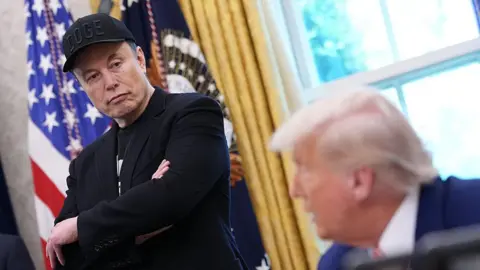Billionaire entrepreneur Elon Musk has publicly expressed regret regarding certain posts he made about U.S. President Donald Trump during a recent engagement on social media. This admission surfaced on Musk’s platform, X, where he stated, “I regret some of my posts about President Donald Trump last week. They went too far.” His acknowledgment comes amid a significant public fallout that has escalated between him and Trump.
The origins of this dispute can be traced back to Musk’s harsh criticisms of Trump’s proposed tax legislation. The Tesla magnate described the tax bill as a “disgusting abomination,” a statement that incited an intense response from Trump. This backlash was notable, especially given their past collaborative history, which has now soured amid their ongoing war of words.
Trump responded to Musk’s assertions by declaring that their relationship had effectively come to an end, and he expressed no intention of repairing ties with the tech CEO. This statement from Trump highlights the evolving dynamic between the two influential figures, who have previously maintained a somewhat amicable rapport. Musk’s decision to publicly regret his comments suggests a recognition of the potential ramifications of their social media conflict, one that was initially ignited by contentious political discourse.
Further complicating matters, the controversial tax bill under discussion not only included significant tax breaks but also proposed a substantial increase in defense spending. This budget was passed by the House of Representatives recently and is currently under review by the Senate, adding another layer of complexity to the situation. Musk’s critique of the tax legislation could be seen as part of a broader conversation on fiscal policy, but it has evidently raised tensions between two of the nation’s most prominent figures.
The fallout from their exchanges underscores the impact of social media in shaping public and political discourse. Musk, with his vast platform and reach, has the ability to influence a wide audience. However, the weight of his words can create challenges, especially when engaging in political debates. This incident serves as a reminder of the volatile nature of social media interactions, particularly when they involve high-profile individuals such as Musk and Trump.
In recent years, Musk has not shied away from voicing his opinions on various political matters, often using his social media accounts as a vehicle for these thoughts. Despite the frequent backlash he receives for his statements, he has retained a significant following and influence. However, his recent expressions of regret may indicate a shift in his approach, as he navigates the complexities of public disagreements in the political sphere.
The broader implications of Musk’s remarks extend beyond mere interpersonal conflict, reflecting the tensions present within the political landscape of the United States. As influential figures express their opinions on contentious issues, the public response remains a critical component of the ongoing dialogue surrounding policies that impact millions. The intersection of social media and political communication continues to evolve, highlighting the necessity for caution and reflection in public discourse.
As events continue to unfold, the scrutiny of both Musk’s actions and Trump’s policies will likely continue, with every post, comment, or tweet carrying the potential for significant backlash or support. Given this fluid dynamic, both credible parties must tread carefully in order to navigate their respective positions both in the public eye and within their professional realms.











